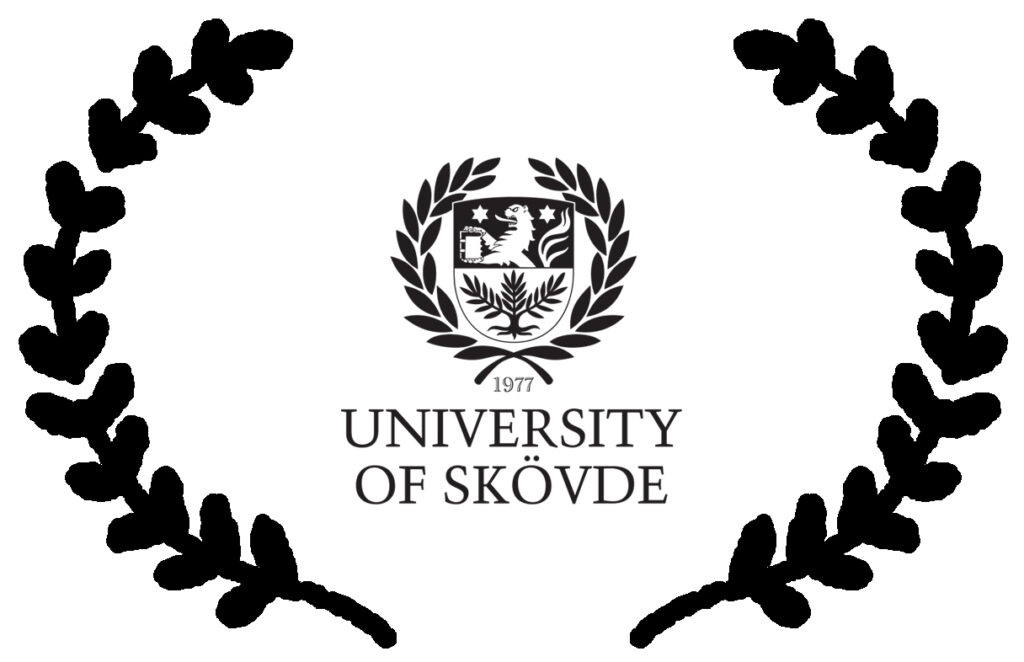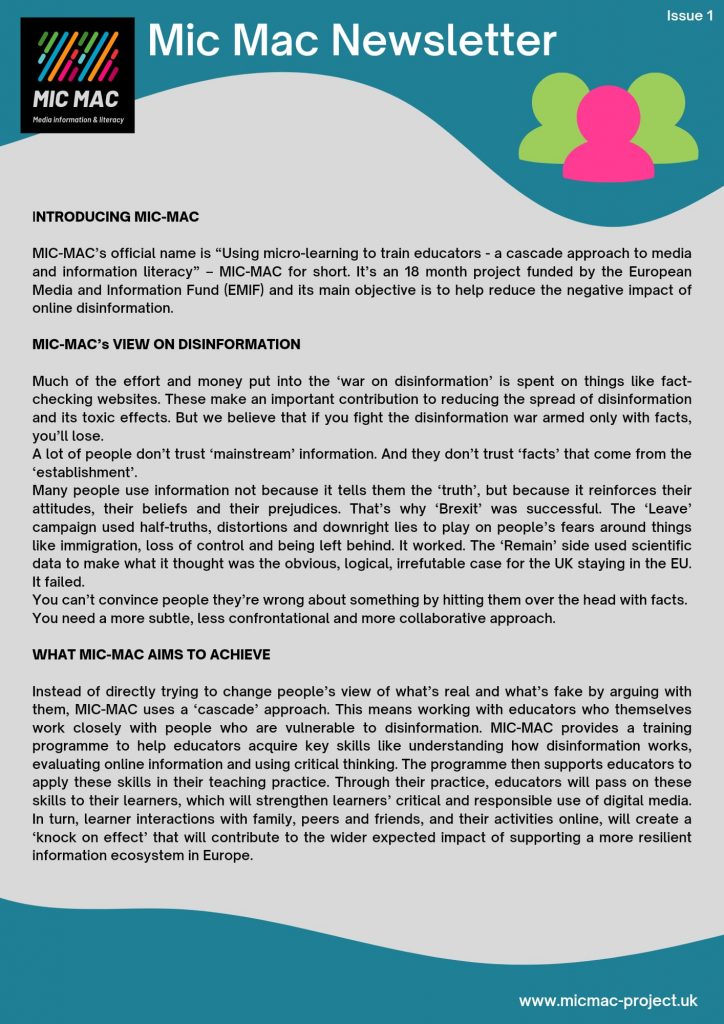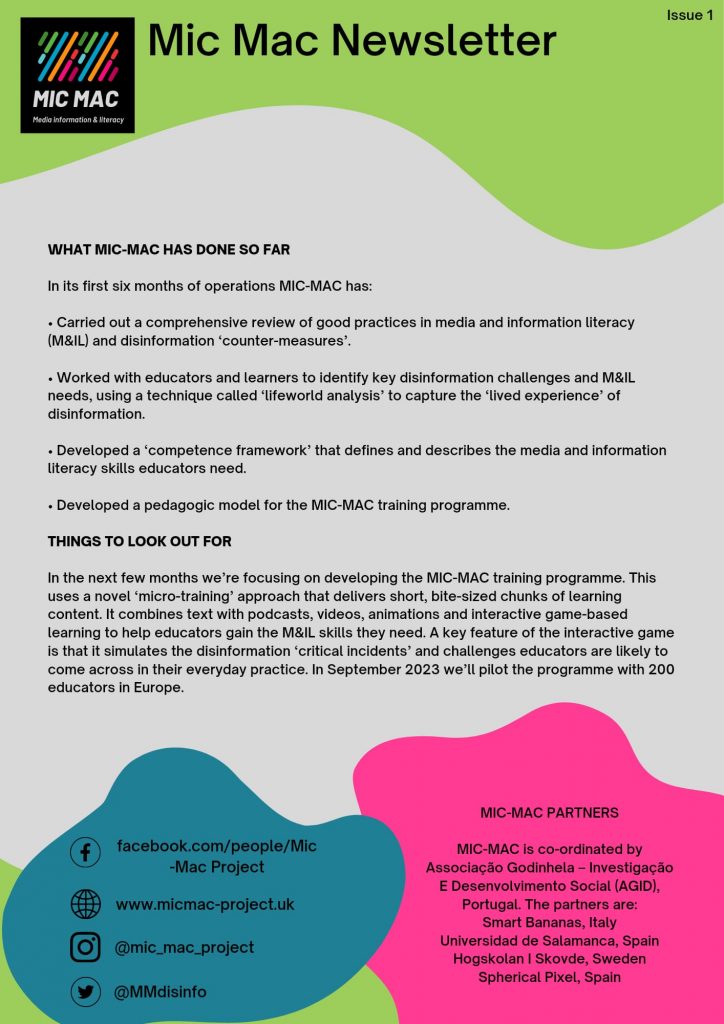
Media and Information Literacy
There is a growing ‘infodemically vulnerable’ population in Europe with not enough of the media and information literacy skills needed to distinguish between reliable and scientifically grounded information and unreliable and fake information. Against this background, educators lack the digital and pedagogical competences needed to improve the media and information literacy skills of learners – particularly vulnerable learners.
MIC-MAC’s solution to this problem is to develop, implement and evaluate an innovative approach to delivering media and information literacy competence training for educators and support them to apply their new skills to work with vulnerable learners, so they in turn acquire new media and information literacy skills that can improve their ‘information resilience’.

The University of Skövde’s participation in MIC-MAC has led to several positive outcomes. Our webinars on the use of AI in university classrooms were well-received, as was our work to increase awareness of the course throughout Sweden. Maria Wickenberg, librarian at the University and project partner, Maria Wickenberg, librarian at the University and project partner, presented some key findings on MIL, including how spread of false information can lead to echo chambers, while Diana Stark Ekman also shared information about the project with the Swedish Association for Distance Education (SVERD)at a national workshop. The self-assessment tool, which was used as a pre- and post-test for the course, has been of special interest in Sweden, with several organisations requesting more information about this. Links to both the Swedish and English versions of this tool are available for a limited time (through December 31, 2024).
Link to Swedish-language self-assessment tool
https://evasys.his.se/evasys/online.php?p=MICMACSV24
Link to English-language self-assessment tool
https://evasys.his.se/evasys/online.php?p=MICMACEN24
Pilot testing of English and Swedish-language versions of MIC-MAC showed a high level of satisfaction with the course. The course was offered on several different platforms, including Moodle and Canvas. (The Canvas versions of the course are available for review at Canvas Commons.) Of the 32 participants who took part in the course, the majority agreed that participation in the training programme had improved their understanding and teaching of M&IL. ‘Every teacher should take a course like this,’ one participant remarked.
The shorter course formats, with content available via film, audio and text, also proved popular. Some unexpected benefits from the project included an opportunity for project leaders in Sweden to become better versed in developing new approaches to edit shorter films and audio files. Skövde’s experience in using the shorter course format in MIC-MAC has led to an increased interest in microlearning for continuous professional development courses in other topics.
New framework provides strong support for media and information literacy
MIC MAC has developed a new Media and Information Literacy (M&IL) Framework that describes the knowledge, skills and attitudes educators need to effectively help learners navigate through the sea of information we meet each day. The framework, which was designed based on interviews and focus groups with several dozen instructors in Italy, Portugal, Spain, Sweden, and the UK, covers three domains: contextual competences, M&IL-specific competences, and techno-pedagogic competences. The framework is available both as a general overview of MIL competences and an elaborated view providing detailed information on specific competence topics, including knowledge, skills and attitudes.
Dr Joe Cullen, who heads up MIC MAC, says that the new framework offers a robust tool to help educators and learning organisations, including schools, universities, VET centres and community groups, design training and continuing professional development courses in M&IL. “To combat the impact of disinformation in our societies, we need fully informed educators,” says Dr Cullen. “MIC MAC’s framework offers an evidence-based, peer-designed approach can help educators build a full range of pedagogical methods to support learners who live in a digital society to find trustworthy information and media sources.”
The framework is especially helpful for educators and professional development experts, to design training courses for people working in online learning environments, to enhance their ability to help vulnerable learners identify and counter the impact of disinformation. To learn more about the framework, please use the contact form at https://agid.pt/contact-us/
Date: March 2024
News February 24
The MICMAC Transnational Webinar “Deep Knowledge versus Shallow Fakes: Algorithms and Their Role in Misinformation Spreading” was held online on February 15th at 18:00 CET, featuring Joana Gonçalves de Sá. As a researcher at LIP (Instrumentation and Experimental Particle Physics Laboratory) and the coordinating investigator of the Social Physics and Complexity (SPAC) research group, Joana shared her extensive expertise, backed by her recent ERC grants to study biases in humans and algorithms using fake news as a model. The event offered valuable insights into the role of algorithms in the spread of misinformation.
News 2 – December 23
As part of the online course for educators, ” MIC-MAC: Media and Information Literacy Competence Training for Educators,” we highlight the significant collaboration of Portuguese national entities throughout the development and implementation of the course in Portugal. This includes the DGRSP (Directorate-General for Reintegration and Prison Services), involving teachers and young people from four Educational Centres. In partnership with APEDI (Association of Teachers for Intercultural Education), the course received accreditation from CCPFC (Scientific-Pedagogical Council for Continuous Training: CCPFC/ACC-122160/23), and is recognized for career advancement purposes, counting towards 50% of its general component (Article 8 of the RJFCP) over the next two years.
Sneak Peak video October 2023
The welcome video for the Portuguese online course “MIC-MAC: Media and Information Literacy Competence Training for Educators” provides a preview of the course, highlighting its structure and key elements. This “work in progress” offers an insightful overview, preparing educators for what to expect in the program.
We’ve curated a selection of videos which you might find interesting.
Our Newsletter



